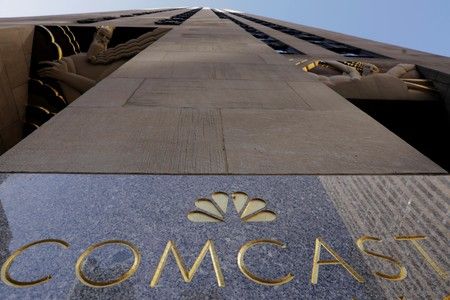By Paresh Dave and Sheila Dang
SAN FRANCISCO/NEW YORK (Reuters) – Comcast Corp <CMCSA.O>, one of America’s largest media and communications companies, is wading into the epic regulatory pile-on against big tech companies such as Google, according to people familiar with the matter.
Behind the closed doors of a congressional task force last month, Comcast’s video ads division FreeWheel accused Alphabet Inc’s <GOOGL.O> Google of using privacy concerns as a pretext to limit FreeWheel’s ability to sell ads on behalf of its clients’ YouTube channels, four people briefed on the discussion said.
Comcast may be drawing a line in the sand and wants to avoid letting Google do to the video ad business what it has done to the online ad market.
It is the first time one of the most powerful companies in the United States, with its own muscular lobbying apparatus in Washington, is taking sides in the antitrust battle looming over the world’s largest seller of online ads. Google’s competitors are warning lawmakers that emerging privacy regulations could help Google extend its dominance.
“FreeWheel would embrace a solution that allowed it to continue to meaningfully serve its clients when they publish their content on YouTube, as it had for over a decade on that platform,” Comcast said in a statement. “Unfortunately, the actions to remove or degrade FreeWheel’s capabilities on YouTube fall well short of that.”
Comcast’s concerns have not prompted a full-on attack on Google, though Comcast has contacted other technology companies to discuss the threat posed by Google, two other sources said.
The issues raised by Comcast and its subsidiary have been echoed widely in the cable and ad technology industries. Most companies that contend Google has unfairly squeezed them out have been reticent to speak out because they rely on Google services and fear retaliation.
But Comcast, which owns media company NBC, Universal Pictures and the Xfinity internet service, is a large spender on state and federal lobbying and election campaigns and a veteran of political organizing.
The House Judiciary Committee, U.S. Department of Justice and a coalition of 50 state-level attorneys general have each asked Google for information about its ads business in recent weeks as they begin investigating potential violations of antitrust law.
Google declined to comment on Comcast’s recent actions but has said it is cooperating with the investigations and that it faces robust competition in advertising, including from Comcast.
PRIVACY PUSH
FreeWheel’s tensions with Google stem from a one-of-a-kind agreement struck in 2009 as YouTube sought to burnish its image with clips from well-known TV channels.
The deal enables media companies such as NBC, Turner, now owned by AT&T Inc <T.N>, and Viacom Inc <VIAB.O> to sell ads alongside their content on YouTube using FreeWheel’s technology rather than Google’s competing tool, ensuring access to their single, preferred system across various streaming websites and apps.
FreeWheel is the go-to video ad server because of its experience, said a FreeWheel client, speaking on the condition of anonymity.
But last year, Google closed FreeWheel’s pipe into YouTube in Europe, citing the EU’s General Data Protection Regulation that imposed new requirements on companies seeking to share consumer data.
In the United States, Google has allowed FreeWheel’s continued use on the condition that starting with tests this month, the tens of media companies reliant on it will be cut off from accessing some user data for privacy reasons, one of the sources said. The data reduction could make FreeWheel’s system less attractive to media companies and their advertisers, potentially prompting a shift to Google, the source said.
Google said a small percentage of YouTube revenue is affected and that it has been working with FreeWheel to restore access in Europe and preserve it in the United States.
A FreeWheel representative brought up the issue at a private hearing in September of the Senate Judiciary Committee’s Tech Task Force, led by Republican Senator Marsha Blackburn, the sources briefed on the discussion said.
Blackburn, who is holding hearings to inform potential privacy laws, said on C-SPAN last week that a Congressional privacy bill being weighed must preserve competition better than EU regulations have. Her spokeswoman declined to comment on FreeWheel’s task force comments.
INTERNET TRACKING
The conflict is playing out on another front. Google said last month it is experimenting with encrypting the internet traffic of Chrome users, and Android has similar capability in its newest version.
The move, technically known as DNS-over-HTTPS, increases users’ privacy and security by limiting some companies, including internet service providers, from tracking users’ browsing.
Internet experts say Google adopting the new technology widely and stringently would cripple tools for parental controls and stifling child pornography online. Trade associations for cable and wireless companies including Comcast told Congress last month that the move could “possibly foreclose competition in advertising and other industries.”
Comcast told Reuters that it was open to working with Google on the issue in way that ensures various security and parental controls are not broken, but that “any unilateral action that limits customer choice will not work.”
Google spokesman Scott Westover said its proposal maintains “all existing filters and controls” and that “any claim that we are trying to become the centralized encrypted DNS provider is inaccurate.”
(Reporting by Paresh Dave in San Francisco and Sheila Dang in New York; Additional reporting by Diane Bartz in Washington; Editing by Kenneth Li and Lisa Shumaker)













Add Comment